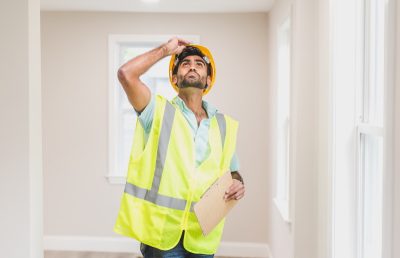
During the escrow period, there may be several inspections requested – from a general home inspection plus any number of additional inspections, such as sewer, chimney, mold, and roof. We will confirm any inspection days and times with you ahead of time and also add confirmed inspections to your property calendar for easy viewing.
Inspections the buyer chooses to conduct are paid for by the buyer. The general inspection usually takes 2 to 3 hours and is an overview of the condition of the property. It examines the essential systems and structural components, including the roof, electrical, plumbing, walls, ceilings, floors, foundation, fireplace, chimney, windows, attic, sinks, toilets, heating, air-conditioning, water heater, appliances, property interior & exterior. The resulting report provides an overall assessment of the property condition and will include suggestions for necessary repairs, upgrades and ongoing maintenance.
We will be there during all inspections. It is preferred that you are not present during inspections but available in case we need to call you with any questions.
Here are some suggestions to prepare for the home inspection:
Prior to the Inspection
- All services should be turned ON (including water, electric & gas)
- The following should be accessible:
- Attic
- Under floor crawl space
- Heater(s) and Air-conditioners
- Electrical panel
- Gas meter
- Garage and all garage doors are operable and accessible
- Exterior of building (walkways clear, gates accessible)
- Pool and Pool Equipment
- Pets are not there or safely secured
- Documentation available (building plans, permits, warrantees, operating manuals), if possible
- If there are any instructions regarding the operation of specific equipment (i.e. swimming pool lights, alarm codes, etc.) please get us that information prior to the inspection date
- Ideally, all disclosures should be completed and returned, if possible.
Optimal Wishlist to Enhance the Outcome of the Inspection
If you are feeling ambitious, here are some considerations which may avoid a pricey Request For Repairs list from the buyer down the line.
- Heating/Cooling systems cleaned and serviced.
- Built-in appliances operable and clean. Verify that all the top elements on the range are working. Replace them if needed. Make sure all the oven fixtures work. Inspect the dishwasher particularly for door seal leaks.
- Exhaust fans operable and clean.
- Laundry dryer vent is operable and clean.
- Water heater strapped and installed correctly.
- Smoke detectors installed in correct locations.
- Gutters and downspouts repaired and cleared of debris. Repair sagging or bent gutters and leaking joints. Check to make sure downspouts are draining properly. Divert water away from the house. “Ponding” water from improper downspout run off is a major cause of flooding in a crawl space.
- Chimney(s) cleaned.
- Roof. Replace missing shingles or repair damaged flashing. Remove or trim back any tree branches that extend over, or near to, the roof.
- Crawl Space. Remove all storage around the access hole. Remove all wood scrap, cardboard and other debris. Any fallen insulation should be repaired or replaced. Check for any obvious leaks at traps and toilets. Check to make sure that all ventilation holes are clear and have not been covered.
- Windows and doors working and broken parts repaired.
- Attic. Check to make sure that exhaust fans do not vent into the attic. Also look for signs of roof leakage. Clear anything that is blocking ventilation.
- Toilets are frequently loose. Tighten the bolts that hold it down (Not too tight, though).
- Inspectors check for leaks, clogs and water pressure by running multiple faucets, flushing toilets and testing appliances like washing machines and dishwashers. Fix leaks and clogs well before an inspection. Caulk where necessary. There are two areas of concern in the tub and shower area; where the vinyl flooring meets the tub or shower, and between the tiles. The breakdown of proper caulking is the major cause of rot in the sub-floor and wall structure surrounds.
- Handle any issues that you know are in need of repair or that are obviously a problem.
Repairing items now eliminates buyer’s objections before they arise. If you think something is too much trouble to fix, the buyer will too. Buyers tend to think repairs will cost more than they do, so the ordinary rule-of-thumb is to repair any defects now at a nominal cost, as opposed to later at the buyer’s perceived higher cost.
Our continued goal is to do everything we can to ensure this transaction is as smooth as possible for you. If you have any questions or concerns, please call us right away.

